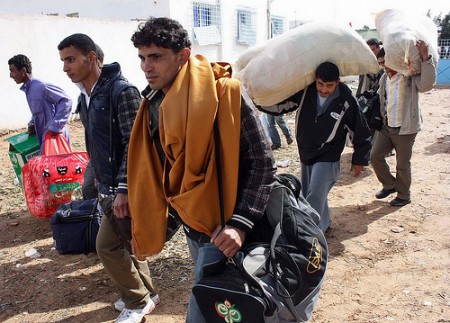
The Kuwait Times reports that before the uprising, there were some 2.5 million migrant workers from various countries in Libya. Some have since returned to their native country on their own, while some required consular or diplomatic assistance. According to international migration officials, 191,748 foreign migrant workers have already left Libya. Of these, 104,275 crossed into Tunisia, 84,973 to Egypt, 2,500 to Niger and 4,000 went to Algeria.
The situation of the remaining migrant workers is tenuous: They have been left to fend for themselves, after employers abandoned them. Unskilled workers do not dare go out as they are fearful of being shot, either by protesters or by forces loyal to Muammar al-Gaddafi. With food, water and medicine shortages, local shops are selling the few available products to Libyan citizens, not migrant workers. This has meant some workers have no money or food, and are approaching the verge of starvation.
The governments of developing countries in Asia – such as Bangladesh, the Philippines, Thailand, and India – are struggling to evacuate their nationals from Libya. Among the masses of foreign workers trapped in Libya and desperate to leave, migrants from Bangladesh comprise the largest number of foreigners ensnared in the crisis and unable to flee.
In a recent article, World Bank senior economist Jahed Hossain Khan said that the World Bank will loan Bangladesh $30 million for the evacuation of expatriates from Libya. The Expatriate Welfare Ministry reports that some 54,000 Bangladeshis are still in Libya or its neighboring states, with 22,047 citizens having already been repatriated between February 28 and March 15, 2011.
The majority of these expatriates are migrant workers, and, according to Migrant Rights, each spent around $2,900 to travel to and work in Libya. The workers were promised a monthly salary of 360 Libyan Dinars ($297) for a work day of eight hours, but were eventually paid only 230 Libyan Dinars ($185), working eleven hours per day.
A Bangladeshi newspaper, The Daily Star, revealed that the authorities in Dhaka had no plan for a full-scale evacuation of their citizens from Libya. The paper quoted the Foreign Secretary Mohamed Mijarul Quayes as saying that the government had instead appealed to companies in Libya and international organizations to help Bangladeshis move to safer places. “The Bangladeshis trapped in the Libyan capital could face a disastrous situation, as rebels and pro-Gaddafi forces fight around Tripoli,” The Daily Star warned.
According to the Bangladeshi Financial Times, the latest news is that the Bangladeshi government is going to provide three hundred US dollars’ worth of assistance to each worker repatriated from Libya, to compensate for the loss of their job – and having to return home empty-handed, officials said.
Repatriation of these workers, however, is in the self-interest of the home countries. According to the World Bank, economic growth and poverty reduction in Bangladesh has been largely due to remittances, which amounted to 10.3 per cent of national income in 2009/10. It is calculated that each migrant worker brings in $816 in remittances annually. The money spent to bring the workers home – and the $300 compensation – is a fraction of the wealth these workers have generated for their country over the years, and as such is not just a humanitarian act.

